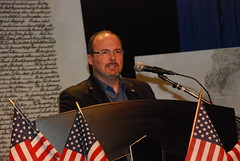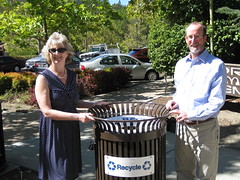 LA Times, SF Chronicle looks for balance
LA Times, SF Chronicle looks for balance
by Brian Leubitz
You have to give both the SF Chronicle and the LA Times some credit to promote moderate Republicans. The state is clearly better served by having (at least) two strong parties. With Tim Donnelly looking strong at the top of the ticket, you have to look for moderates elsewhere. Both papers endorsed non-partisan Marshall Tuck for the non-partisan State Superintendent position, because, you know, he doesn’t like labor and wants us to charter school and test our way to educational nirvana.
Unfortunately, ex-legislator Tom Torlakson, who now occupies that office, is much too deferential to the teachers unions. Torlakson, a former teacher, is a dedicated and knowledgeable advocate for education – but when tough choices need to be made, he too often ends up on the wrong side. For example, Torlakson has opposed attempts to consider student test scores as one factor in teacher evaluations, a dogmatic stance that cost the state federal dollars. (SF Chronicle)
It appears that the Chronicle is upset because Torlakson doesn’t support the failed “Race to the top” scheme. Note failed isn’t merely a personal opinion: it’s backed up by hard research. The grants were too small, the goals too big, and the guidelines were not necessarily the right path to meet our real educational goals. So rather than merely castigating (former teacher) Torlakson for standing up for teachers, perhaps we should investigate why he made those decisions. We simply can’t test our way to educational success, Torlakson knows this.
But you have to laud both papers for looking for better educational outcomes. But when we spend less per pupil than states with much lower cost states, perhaps we need to look in the mirror first. And perhaps we should be doing the same thing in the Secretary of State race, and it seems that both the Chronicle and the Times have looked to the Secretary of State race for some balancing.
The Times endorsed Pete Peterson this morning and the Chronicle endorsed Dan Schnur last week. Both are Republicans, though Schnur has now moved away from that label in an attempt to win the center. But neither has the looks of a career politician, and both editorials mention the fact that neither appear to be looking for the job as a stepping stone.
For the SoS gig, these are some laudable aims. But they’ve both looked past the best candidate. A candidate that has a history of working for a better campaign finance system, Derek Cressman. Cressman appeared last week in San Francisco to protest the big fundraising at the annual AT&T Speaker’s Cup, and would use the office as something of a bully pulpit. But more than that, he has the management experience to take on the real dysfunctions of the office that are the heart of the job.
Peterson and Schnur are both reasonable options, but in a Democratic dominated state, we need a Democrat with a history of advocating for real and substantive reform with the experience to run a big office. That’s Derek Cressman.



 Sugary beverage warning stalled over $400,000 bill
Sugary beverage warning stalled over $400,000 bill